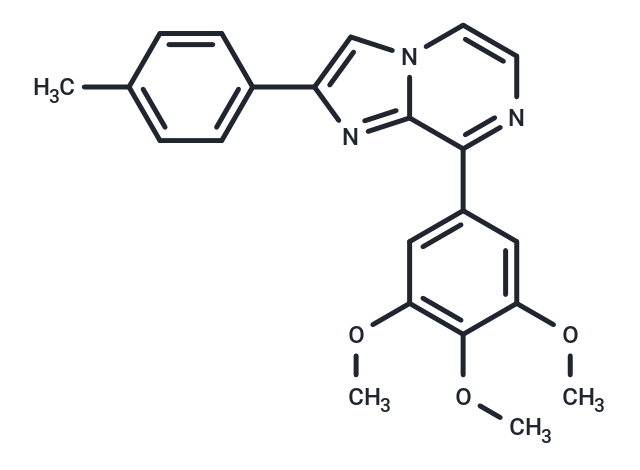Shopping Cart
- Remove All
 Your shopping cart is currently empty
Your shopping cart is currently empty

Tubulin polymerization-IN-47 is a tubulin polymerization inhibitor and mitotic inhibitor with antitumor activity and inhibitory effects on neuroblastoma cancer cell proliferation, with IC50s of 7 and 12 nM for Chp-134 and Kelly cell lines, respectively. Tubulin polymerization-IN-47 is a candidate compound for the treatment of hepatocellular carcinoma, colon cancer, lung cancer and breast cancer.

| Pack Size | Price | Availability | Quantity |
|---|---|---|---|
| 1 mg | $54 | In Stock | |
| 5 mg | $128 | In Stock | |
| 10 mg | $213 | In Stock | |
| 25 mg | $428 | In Stock | |
| 50 mg | $688 | In Stock | |
| 100 mg | $957 | In Stock | |
| 500 mg | $1,890 | In Stock |
| Description | Tubulin polymerization-IN-47 is a tubulin polymerization inhibitor and mitotic inhibitor with antitumor activity and inhibitory effects on neuroblastoma cancer cell proliferation, with IC50s of 7 and 12 nM for Chp-134 and Kelly cell lines, respectively. Tubulin polymerization-IN-47 is a candidate compound for the treatment of hepatocellular carcinoma, colon cancer, lung cancer and breast cancer. |
| Molecular Weight | 375.42 |
| Formula | C22H21N3O3 |
| Cas No. | 2834087-62-4 |
| Smiles | O(C)C=1C=C(C=2C=3N(C=C(N3)C4=CC=C(C)C=C4)C=CN2)C=C(OC)C1OC |
| Relative Density. | no data available |
| Storage | Shipping with blue ice. | ||||||||||||||||||||
| Solubility Information | DMSO: 6.67 mg/mL (17.77 mM), Sonication is recommended. | ||||||||||||||||||||
Solution Preparation Table | |||||||||||||||||||||
DMSO
| |||||||||||||||||||||

Copyright © 2015-2025 TargetMol Chemicals Inc. All Rights Reserved.